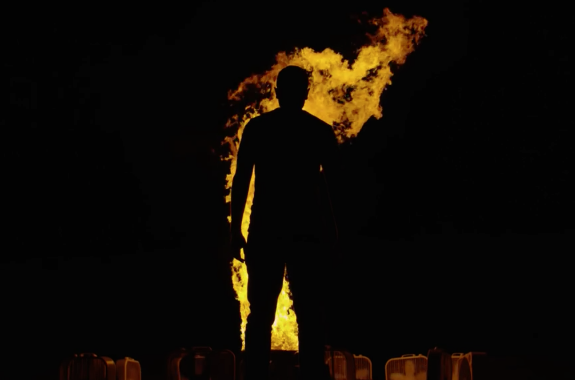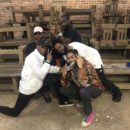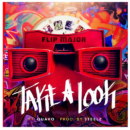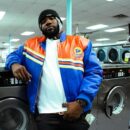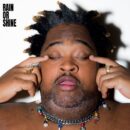In my three years in Minneapolis, I have had the pleasure of sitting down with some incredible artists, from local up and comers to national acts, but one had escaped me for too long. Having planned it for the X Games but a last-second sickness kept me from it and had me thinking it might not happen. On November 8th I had the chance to make up for the X Games and sit down with an artist and teacher whose works have spoken to me for some eight years since I first heard of him. Just before taking the stage for his Shadows On The Sun Anniversary Tour, I had the pleasure of sitting down with Brother Ali for a conversion I had been waiting years for.
UHH: My name is Isaac Ford and I work with Upcoming Hip Hop. If you wanna tell our viewers who you are, what you represent, and a little bit of your backstory.
Brother Ali: I'm an independent artist. Me and Rhymesayers started at a time when there was a cohort of artists who never would've had opportunities to get record deals. It wasn't a conscious choice that we made, in the sense that we had a choice between going mainstream or being underground. Most of us didn't have a choice, most of us were either not going to have careers, or we were going to do it the underground independent way. There were very few that did have a chance, that could have gone mainstream and chose to be underground. Atmosphere is one of those. So we basically made our music, we had people in the local scene that part of their weekly routine was coming to see up perform. There were weekly nights, there was a new hip hop scene in the Twin Cities, and Rhymesayers was at the forefront of really understanding that, and making music that spoke to people and that was interesting to people and that was off the beaten path. Making music that wasn't inspiring to be on the radio.
This is one of those moments, whereas a fan I just sat back to enjoy the story of someone who you have only know as a legendary artist at his craft explain his upcoming and to think about those newer artists that I have noticed having the same drive and wondering where they might end up. Having heard the start of Soundset, the start of Rhymesayers, the start of Stophouse and now, the beginnings of Brother Ali, it was all I could do to not be encapsulated.
Brother Ali: And it really was influenced a lot by indie rock and punk in a lot of ways. Most of us that came up in hip hop listened to a lot of hip hop and we hung out with other hip hop people. We didn't have a lot of exposure to indie rock and punk, but Slug and a few other people did. They understood the punk world, they understood the indie rock world, and they kind of envisioned an opportunity for underground hip hop to be that way. To make music that's not attempting to be anything it's not, to really then find the people who mainstream hip hop might speak to them, but probably not and just go direct to those people.
I've always talked about my love of punk and metal music and how the transition to hip hop was easy because the first artist I really listened to being Tech N9ne. I have always found other genres influencing each other and it doesn't surprise me that Rhymesayers in its early stages emulated parts of punk and indie rock cultures or that they continue to support artists of that nature with their up and coming rockstar deM atlaS.
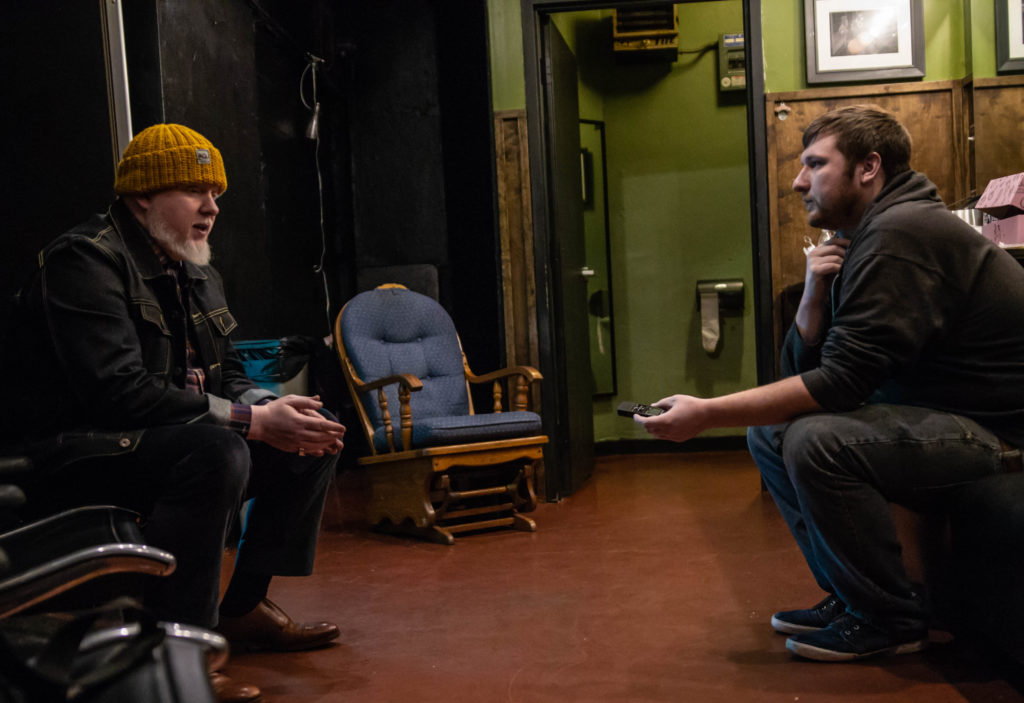
Photo by Claire Jane @clurrbina
UHH: Yeah, that's cool to kind of see that come full circle with an artist like deM atlaS, whose kind of got a more punk style to him, or grunge rock style to him. So I wanted to get a little bit into the single you just dropped, Sensitive. The thing that I really found interesting was that sample that you used from Erykah Badu's Tyrone.
Brother Ali: It's from the speech before Tyrone, so just to be clear, I did not sample Tyrone. Yeah, cause that would be illegal. I did not sample the song Tyrone, I sampled a public speech that she gave on stage before she performed Tyrone.
UHH: Okay, and so with that, cause I know there's a song by Tech N9ne called Fragile, and he ends off his verse by saying "I'm an artist and I'm sensitive about my shit." So, was there kind of a more personal connection to you with that speech that she gives in that vocal, and why was it used I guess.
Brother Ali: Yeah, see I didn't know about that Tech N9ne song, like there's so much Tech N9ne music, you know what I'm saying?
UHH: Like 5 albums a year.
Brother Ali: And he came up and around the same time that we did, and he's one of the other really incredible leaders in underground music, especially for the Mid-West. So I really admire and respect him a lot. He's really good to other artists, that's one of the things I love about him the most. Being independent, you kind of have to be like that. The really successful people are that way, most of them are anyway. So I know and respect him, but I don't [know that song] ... To know all of Tech N9ne's music, it's a big project.
Tech N9ne is no small name, but it is always heartwarming to me to find out artists I like listening to music I like. Similar to Tech n9ne, Erykah Badu's look wasn't exactly accepted by the mainstream and that was something that really spoke to Ali.
Brother Ali: And so I didn't know about that song. But we both obviously know that Erykah Badu quote. We're around the same age, he might be a few years ahead of me, but that particular speech that she gave and that album and that song and all that, that really was big because she also kind of had came out into the mainstream, but didn't have a mainstream look or sound or content. The entire feel of what she was doing was really different and so she, I think, also has really transcended generations, because there's a lot of young artists that you know, like Tyler the Creator, [whose] favorite artist is Erykah Badu. She's like -
UHH: Yeah, still influencing younger generations.
Brother Ali: Yeah, and so that feeling though, really all artist have that. It's just some of them pretend not to, and that's one of the things about my particular cohort of independent underground artists, is that a lot of us would not ... We didn't have this tough guy image, and even if we did; I had a little bit of it, but it didn't stop us from making music that people would cry too and what really opened it up and really [connected us].

UHH: Yeah, and I think that's vital. I mean you see a lot more of a fandom come from that. I mean you get a fan of these mega stars and what they have is a lot of fans that kind of like them. But you get some of these underground artists that you make music that connects to people, so the fans that you have, even though you may not have 10 million fans, those fans you have are much more connected to your music.
Brother Ali: Yeah, it's like the difference between being wide and shallow or narrow and deep. It's very deep.
This connection to the fans is something that makes artists more relatable. Finding emotional connections or a piece of you in the artists is what makes lifelong fans. Losing an icon like Stan Lee who understood this concept in his superheroes, Rhymesayers similarly understood that a byproduct of their personal trials and tribulations would create a deeper connection to the fans, this is seen not only through music but in their never-ending ability to talk to fans before during and after shows. This tour brought back a lot of these old nostalgic feelings, fittingly since it was an anniversary tour for one of Ali’s most personal albums.
UHH: So getting into this tour you're on, the anniversary tours for Shadows on the Sun. And I mean this album alone is enough to me to put you into the elite category, I mean you've got a great body of work, but this album, to me, was just such a powerful album. And I wonder what your mindset going into an album like this, the political times of that time and how that influenced this album, and just what really pushed you to go into talking about something that [is not necessarily] controversial, but it's something that people are uneasy to talk about certain subjects, and you didn't seem to have any fear talking about these subjects and bringing light to people's eyes obviously.
Brother Ali: Well that was not as overtly political as some of the other ones are, I don't think. But, you know, so for me, I wasn't thinking about politics. I was broke and not eating very much and just really struggling, in a dangerous situation. So it's political in a sense that I was living a reality that was caused by politics. There are inklings of it, though. There are kind of hints at it, but I was definitely talking about being poor, and that has political implications. But when we made that album, I didn't have any, I didn't even know if anybody would hear it. So I literally was trying to make the most real powerful and just dope music that I could, which is a lot of self-exploration before expression. You know the thing about Ant's music is that it always made me sit with it and like "Why do I feel like this? Why does this music make me feel like this? What does it make me think of when I have this feeling?" And then either tell the story of what made me feel like that or try to describe the thoughts that I had for my own to the feeling the music gives me.
I have been working hard to put myself in front of some of my favorite artists and it usually ends up in me at least once an interview just truly hearing something that makes me think or makes me genuinely smile and this was the latter. Hearing one of the greatest to ever do it talk about his process, especially when it comes to working with a producer like Ant. While this usually happens once an interview I found this happening over and over again in this interview.
UHH: Yeah, yeah and that's true, with a lot of music, having somebody like Ant who can really bring out an emotion from other people. I mean, what he did with Dem Atlas' new album and what he's done with Slug for so long. The ability for him to really create a story before the words even come in, and you know kind of the feel of a song before that. With a lot of artists, I like to dive into the past and kind of go into a lot of stuff, but I think you, to me, you've grown so much in the last 15 years or so. And one thing that I really enjoyed about your last album was how positive the outlook on the album was, even when talking about harder things to talk about, there was always such a positive tone to it. So I wonder, how do you keep that positivity going, finding that beauty in a nation, now that seems to be kind of driven by hate and driven by pain?
Brother Ali: Well I've never taken my queues from what the masses of people are doing. I never felt like that had anything to do with me, which didn't start when I became an underground artist, but you know, being an albino I think had a lot to do with it. Moving a lot, and being the new kid so many times, and then I became a Muslim, and hip hop came before that, hip hop actually led me to Islam. But hip hop, when I started doing it, wasn't popular. Most people, even most black people, didn't listen to hip hop, and it wasn't their identity to listen to. Then Islam, and then being an incoming independent artist there's really never been ... Whatever the main group of people are doing, I never felt like I needed their permission, or that I even took my queues from that.
In a world that’s constantly telling us to be different while melding us to be the same, Brother Ali is able to block this out and focus on building his own life in a way that will satisfy his inner self and those he loves. Remembering that beauty is always prevalent is one thing, but Ali would go on to explain why finding beauty is more than just fighting hate.
So I think that whatever comes out in the music is really what's happening with us, with me. And I'm in a place where I didn't necessarily make it specifically to be a combat from what's happening in America, but I think that there's always beauty. It's important to focus on beauty, it's one thing to condemn deprivation of beauty, or ugliness. It's one thing to condemn hate, and that's fine, but it doesn't take a lot of creativity to do that, especially right now. When I made my most political album, it was when Obama was in office, it was when most people on the left were really chilling, self-victorious, and felt like the country. People that believe in this idea of being progressive were like "We're making progress." That's never been my political ideology. Malcolm X said "Don't put a knife, nine inches, in my back and pull it out three inches and call it progress." Progress to me ... It's a word to me that feels plastic. So I made a very political album, like "Wake up and look at how much is going on," in 2012. And when I did that, it was really weird. It felt really strange to people, and so now people are making more political music and people are angry and everybody with the "Go vote!" Everybody now, "Go vote! Go vote! Go vote!"
This section was not just important in understanding the type of man Brother Ali is and always has been. This is normally something I would have put into my own words or shortened but I couldn’t do it just and I certainly couldn’t leave this out, so instead I just spent a few sentences to give your mind a breather before you take in the rest of it. Enjoy.
Brother Ali: And like yeah, voting's cool, but what about organizing and what about all that kind of stuff? So I think that it's one thing to be able to diagnose ugliness, or the deprivation of beauty, or to diagnose that, but to actually prescribe and administer beauty, that's what artists real job is. Everybody knows that it's bad right now, there's nothing really special about that. There's nothing special about critique, everybody feels like they're very, like this really creative, like "I'm the person that critiques things the best." Like cool, there's a lot to critique, there's no shortage of that, but to me, the artists are the people that can actually prescribe beauty and administer beauty, even in times when it's hard for other people to do
UHH: Being able to do what I do, I like to reach out to the fans and kind of get something from them and one girl had reached out. Her name is Allie Glover from Henderson, Tennessee and she actually had a friend, one of her really close friends passed away recently and both of them were huge fans of yours. So I thought I would reach out to her personally, but she asked "Is there a song by another Rhymesayers artist that you would dedicate to your kids, and if so by who and what song and why?
Brother Ali: It's difficult cause I make songs for my kids.

UHH: Right, and I think its because of those songs she asked this question.
Brother Ali: Yeah, like is there another ... I mean Slug makes great music for his kids. I feel like we kind of learned how to do that together, you know what I mean. His music became much more specific when I came around. He closed in to all the metaphors about Lucy and all this stuff. And then when I came making songs directly talking to the people in my life, then he started doing that too. But then he took it to a new level, and then I took it, you know what I mean?
UHH: Yeah, one thing I have loved about Rhymesayers is that the competitive nature isn’t driven to be the best, but driven to be your best and bring the best out of the rest.
Brother Ali: Yes, so we really kind of feed on each other, or feed each other and help each other grow in that way. Another Rhymesayers artist that I would dedicate to my kids… There's not, because I write the songs for my kids, and they write the songs for their kids. I think it's important for people to really know and hear, it's important for people to know how influential Musab is in Rhymesayers.
For those reading this that are not familiar with Musab, local Minneapolis artist and co-founder of Rhymesayers, stop reading this and listen to a few of his songs. It wasn’t just his abilities as an artist as much as his ability as a person to influence those around him. To this day many local rappers in the scene are heavily influenced and look up to Musab as one of the most important people in the city.
Brother Ali: I think that's a real, that's kind of a missing piece.
UHH: Yeah, absolutely. I mean and not just Rhymesayers, but even in the local scene. He is ... Some of my favorite local artists are the ones that introduced me to his music and to just his standing in the community and what he's done for [inaudible 00:15:13].
Brother Ali: He's a leader in this instant. He brought Slug and Ant together and they created ... Musab really created the way that we make music. And he's a person who could have been in the mainstream. He has the look, the voice [and everything]. He probably could've been in the mainstream, and even when he was really young, he was very vulnerable with for music. So me especially, he's the one that really gave me permission and confidence to do that. For Slug to do it, Slug was kind of a ... Slug kind of had that emo label that people gave him. So for Slug to do it, I was like "Oh, that's how you write songs." But for Musab to be vulnerable while he was still in danger, like he was still living in danger and being vulnerable, that's the thing that's really [spoke to me].
UHH: All right, well yeah, I just wanted to say thank you one more time.
Brother Ali: Yeah, I appreciate it.
In an iconic venue, with an iconic artist, I was able to once more live out my dream and speak with a man I have respected for years. You can find Brother Ali on tour this Fall on his ‘Shadows on the Sun Anniversary Tour’. From his unwillingness to conform to the masses to his ability to create art that speaks to the heart, Ali continues to showcase his ability to connect to the audiences.
Brother Ali on Social Media:
Instagram @brotheraliisblind
Twitter @BrotherAli
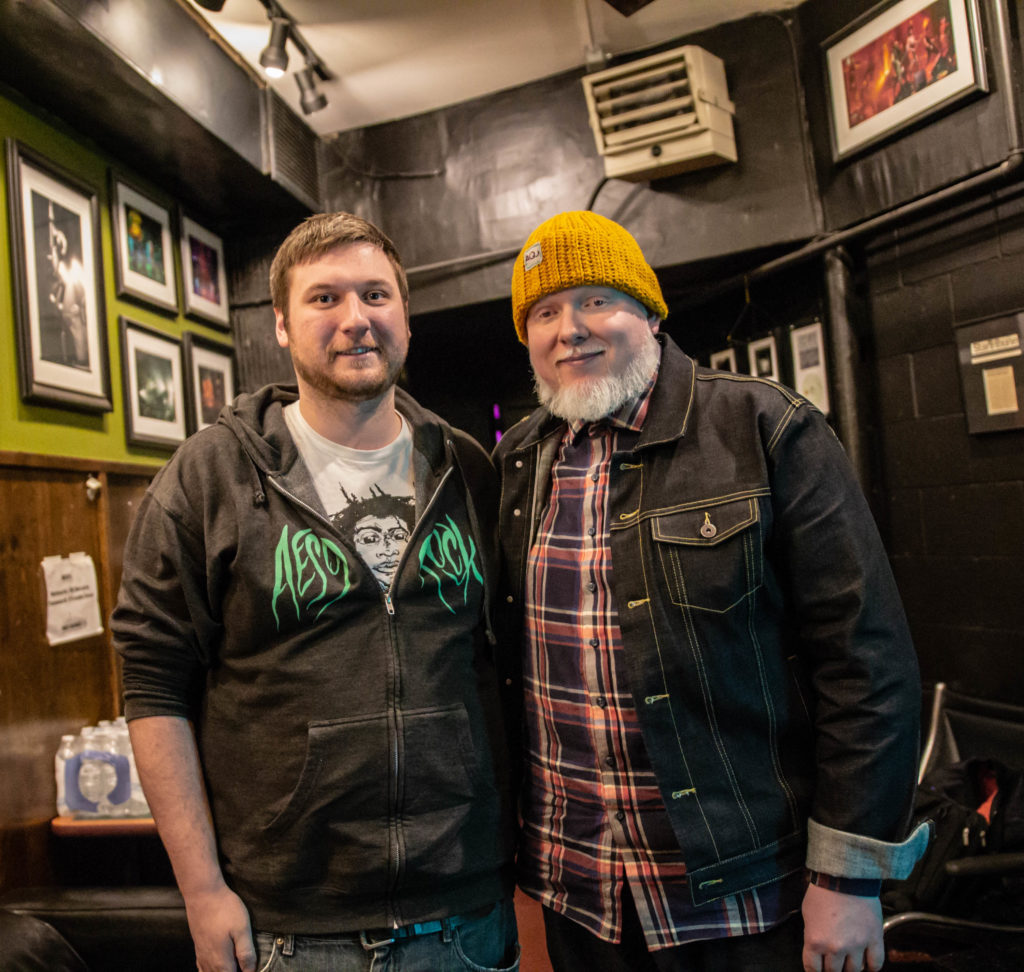
Photo by Claire Jane @clurrbina
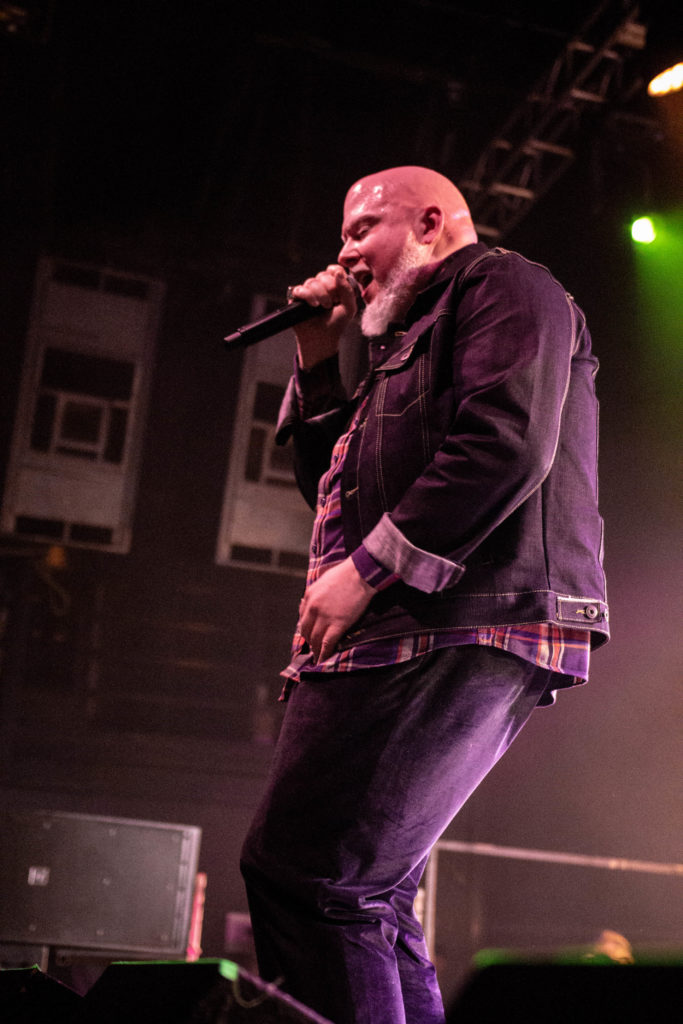
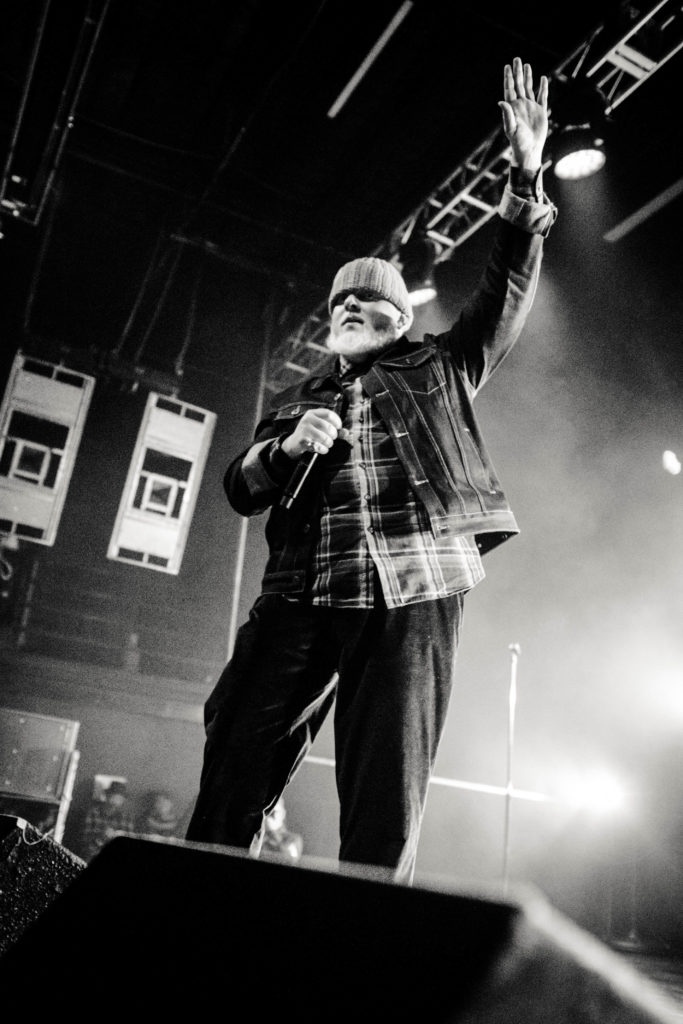

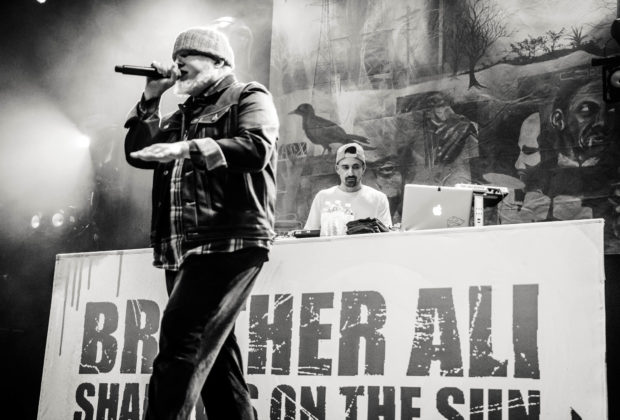

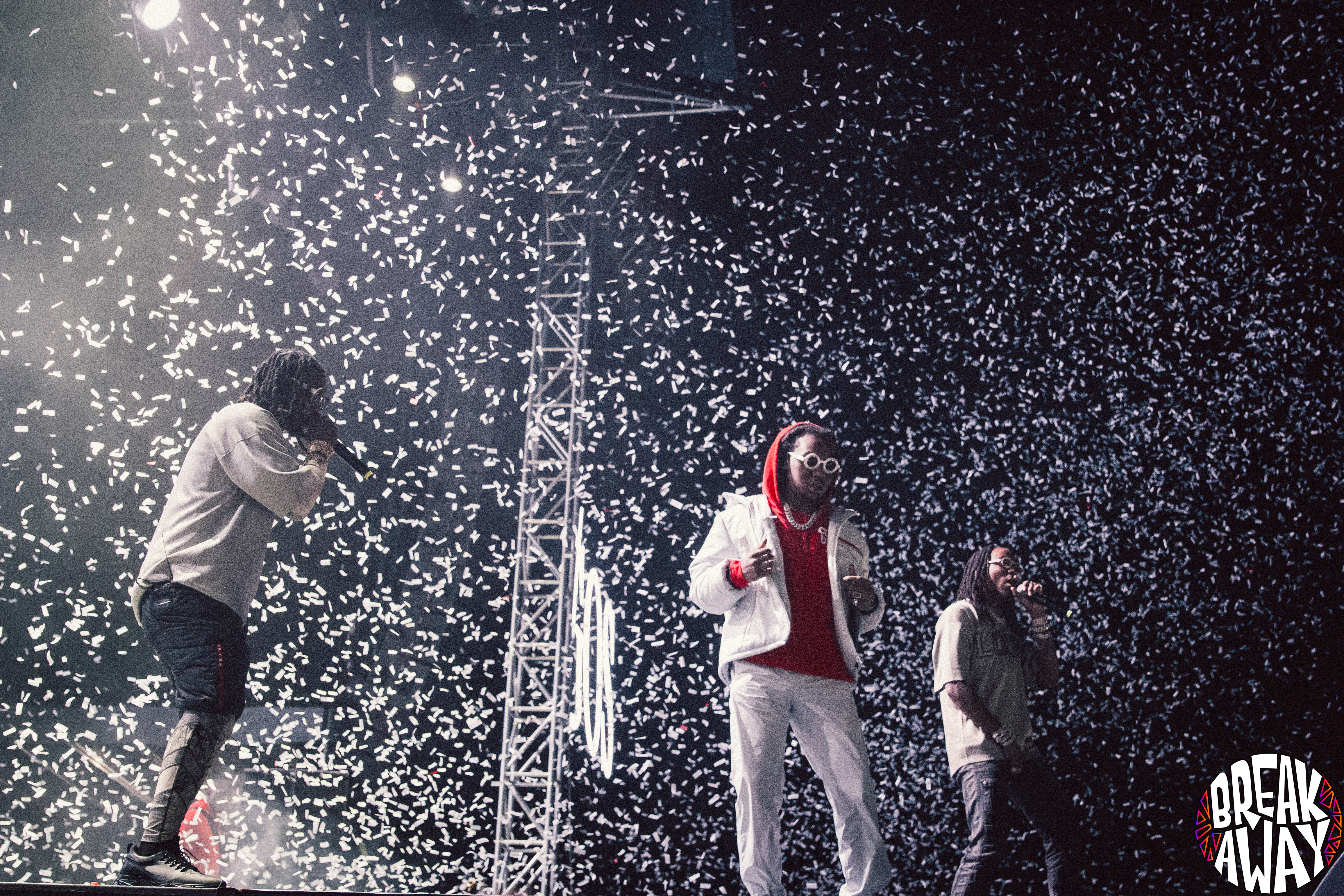
![[Photos From Last Night] Logic's Everybody's Tour: Joey Bada$$ Shines in the Darkness](http://upcominghiphop.net/wp-content/uploads/2017/08/17-5-350x320.jpg)
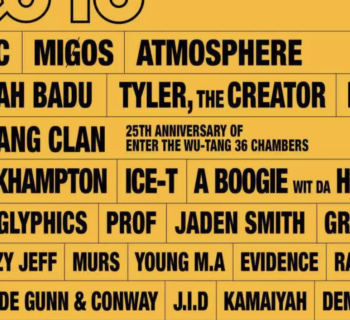
![[Audio] 'Motif ii EP' - Greg Grease](http://upcominghiphop.net/wp-content/uploads/2015/12/Screen-Shot-2015-12-22-at-5.08.11-PM.png)
